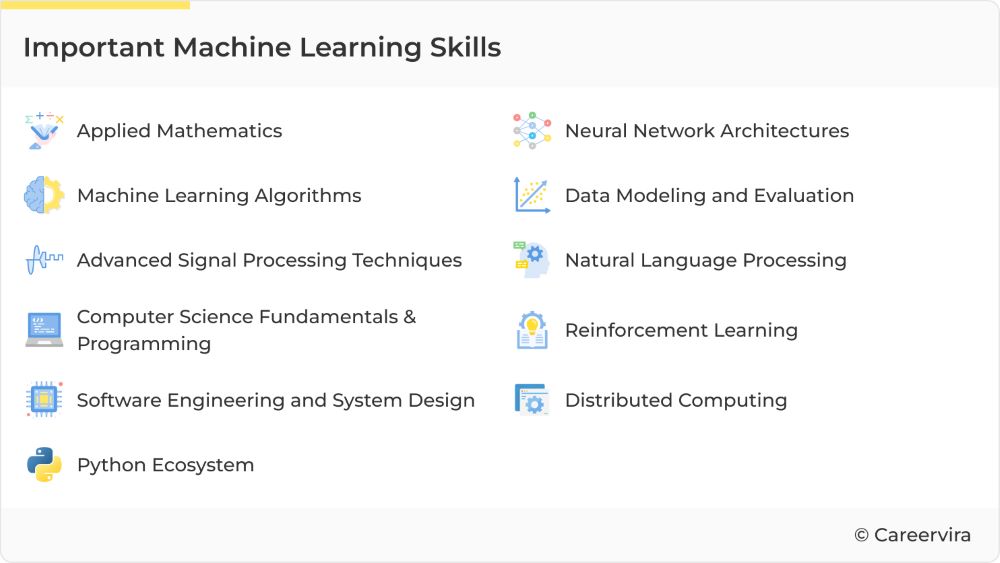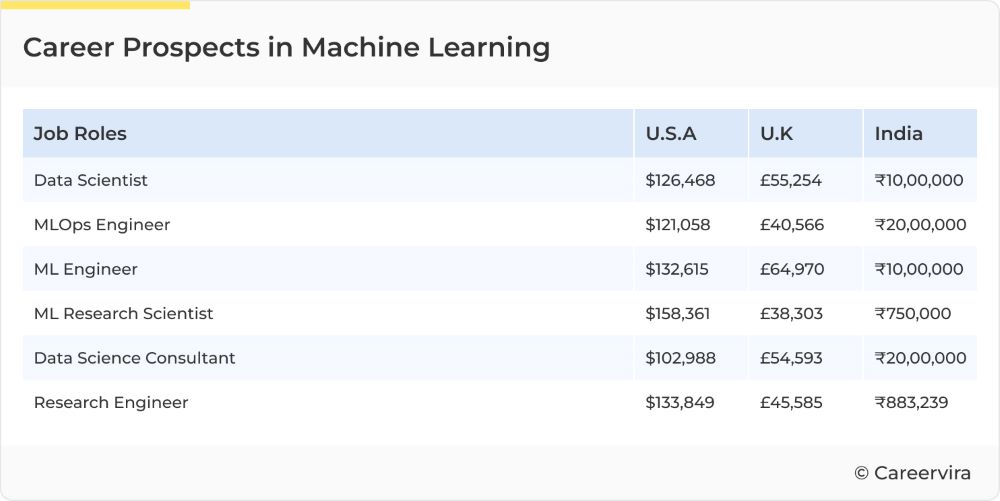What is Machine Learning? Why is it Important for Technology Professionals?
Machine Learning, or ML, is a sub-category of artificial intelligence where coding and programming focus on creating algorithms. These algorithms teach machines how a human learns from a given data set and how they adapt when more data is given.
Technology professionals need to upskill and learn about AI/ML as companies shift toward automation. The job of a tech professional is taught to a machine via coding, NLP, and algorithm. It is advisable to upgrade the skillset where instead of manual work, the professional teaches automation to the machine. The benefits of Machine Learning are often found in sectors like banking and finance, transportation, automation, healthcare, traffic prediction, chatbots, and infrastructure.
In a research article, Zippia stated that 82% of enterprises prefer employees with ML and AI skills. The pandemic boosted the completion of pending AI/ML projects. 83% of the enterprises have increased budgetary expenditures AI/ML. Hence, it is important to upskill to prevent AI/ML-led substitution to stay on top.
Important Machine Learning Skills for Career Advancement in 2023
In technical fields like AI/ML, only highly skilled workers keep up with the job profile and constant updates. Are you ready to become a Machine Learning Expert? Here are a few important technical skills an aspiring professional should possess to get in the ML industry.
- Applied Mathematics: Mathematics has many applications in the Machine Learning field. It can be applied to select a correct ML algorithm for the data and helps set parameters and statistical modeling. Statistics is very important for an ML professional as its the basis of ML. Applied mathematics helps in and deciding validation strategies. Concepts like linear algebra, probability and statistics, algorithms and optimization, and multivariate calculus are important.
- Neural Network Architectures: Neural networks are predefined algorithms that implement ML tasks. These are modeled keeping in mind the human brain and its neurons. A deeper understanding of neural networks helps in understanding parallel computations and sequential computations. Understanding the working of the input layer, hidden layer, and output layer helps tremendously in comprehending how to learn from data. Learning these skills is important as they pave the way for AI.
- Machine Learning Algorithms: Learning ML algorithms is important for a professional so that they know which algorithm to use and where. As an ML professional, working with multiple packages, libraries, and algorithms is standard hence knowing them is important. A few must-know algorithms are the Naïve Bayes classifier, K means clustering, support vector machine, Apriori algorithm, linear regression, logistic regression, decision trees, and random forests.
- Data Modeling and Evaluation: Given the dominance and dependence on data in the current era, data modeling and evaluation proficiency is pertinent. Modeling helps identify underlying data structures, which helps find patterns oblivious to the naked eye. Evaluating data with suitable algorithms to speed up the evaluation process for further analysis is part of the job. Given the ocean-like volume of data generated, knowing suitable algorithms is necessary.
- Advanced Signal Processing Techniques: It is important as its main job is to minimize noise to extract the best component out of an existing signal. Learning concepts like greedy optimization, convex optimization theory, and algorithms is important. A professional should know the use of spectral time-frequency analysis of signals. Proficiency with algorithms such as wavelets, shearlets, curvelets, bandlets, and contourlets is preferred.
- Natural Language Processing: NLP is a fundamental part of Machine Learning. NLP teaches the computer all about human language, its dynamics, and its complexities. It enables machines to comprehend and interpret human language and communication optimally. NLP libraries exist to break human communication into syntaxes for extraction and processing. Hence a strong command over NLP and its libraries is necessary to excel as an ML professional.
- Computer Science Fundamentals and Programming: Programming languages like Python, C++, Java, Hadoop, Spark, Apache, Kafka, MATLAB, and R are essential. Professionals must know coding languages to train machines.
Expertise in fundamental concepts like data structures, sorting and optimizing algorithms, computability and complexity algorithms, and computer architecture is essential. Python is the most preferred language for ML programming, given its all-in-one nature and extensive libraries with APIs, ease of integration, and higher productivity.
- Reinforcement Learning:This skill helps further understand and develop deep learning and artificial intelligence. Possessing advanced skills helps a professional stand out in the lot to become the most desirable candidate.
- Software Engineering and System Design: An ML professional will ultimately work on a code that will either be an algorithm, NLP, or automation. Knowing best practices for system design, coding, version control, and testing is beneficial. Professionals must know how to communicate with various modules, library cells, and REST APIs and rummage through databases for queries.
- Distributed Computing: An ML engineer works with either an isolated system or cluster of systems as and when the situation demands. Professionals must analyze huge datasets properly to avoid errors, be it on a signal system or a group of systems. Hence expertise in distributed computing is a must.
- Python Ecosystem: As discussed above, Python, for many reasons, is the most sought programming language for an ML professional. Learning about the components of the Python ecosystem is necessary as well. The components are Jupyter Notebook, Numpy, Pandas, Scikit-Learn, and TensorFlow. They help with easy illustration, Fourier transformation, modeling and data preparation, clustering, model reduction, regression, simulation of engineering models, and applied machine learning.
Top Job Roles for a Career in Machine Learning
If you are considering having a career in Machine Learning, here is a list of job opportunities.
- Data Scientist:
- MLOps Engineer:
- ML Engineer:
- ML Research Scientist:
- Data Science Consultant:
- Research Engineer:
How to Learn Skills To Become A Top Hire In The Field
To advance your career in Machine Learning, here are a few courses to help you improve your skills. A skilled candidate is the most desired one. Indulge in courses by Simpliv LLC on Careervira to enhance your hiring chances.
- 6 Hour Live Training on Supervised Machine Learning for Data Science For Beginners and Professionals by Simpliv LLC: The module imparts advanced skills like supervised learning, Python programming, data science, and machine learning. It also focuses on algorithms, regression, classification, clustering, supervised, reinforcement, and unsupervised learning, Github, and exporting projects in Github. By the end of the study, you will be able to code ML projects.
- Python for Data Analytics and Machine Learning Bootcamp by Simpliv LLC: This is a 25-hour course that focuses on imparting essential skills like Python programming, machine learning basics, data analysis, and data visualization. It also teaches about Jupyter Notebook and other Python ecosystems. It focuses on statistical analysis and statistical modeling, linear regression, and classification techniques. The course teaches k-means clustering and hierarchical clustering as well.
Conclusion
In a research paper by Fortune Business Insights, ML is expected to grow by a CAGR of 38% by 2029. In 2021 ML market size was estimated at USD 15.44 billion. ML has made technological advancements like self-driving cars, Alexa, smart devices, Google Homes, chatbots, and Molly and Angel, the virtual nurses Soon, AI-powered bots will do 100% of menial and technical work. ChatGPT has displayed its capacities and expertise in doing various tasks as well. Hence it is necessary to update the required ML skills for job retention and growth.





![Python Loops and Functions: Complete Guide [With Examples]](http://43.205.25.73/wp-content/uploads/2020/03/0-100x70.jpg)